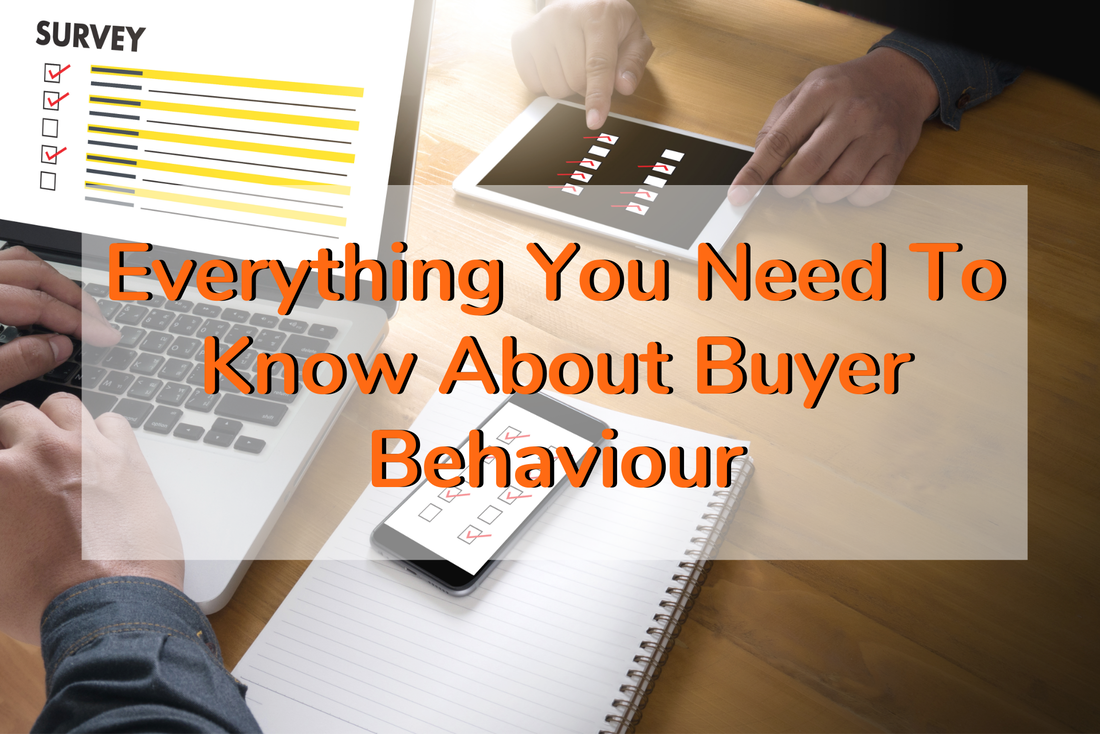The psychology behind buyer behaviour greatly influences the way your audiences act and react. This is one of the fundamentals of Marketing that allows businesses like yours to understand how customers think and act.
To help you understand buyer behaviour more thoroughly, here is a complete guide.
What is buyer behaviour?
It refers to the actions and steps buyers take before making a purchase – either by searching for information on the web, discussing with other people, engaging on social media platforms or finding content.
Understanding this buyer behaviour is vital to your Marketing, as it allows you to tailor your campaigns and promotions in accordance with what motivates your audience to act.
Most often, buyer behaviour is measured by using software programs that analyse customer relationships online. Obtaining insights through surveys and interviews is also effective in understanding why your audience behaves in the way they do.
For more, read: How to Know Your Customer: 11 Insights Into Behaviour You Need To Know
What is the buyer decision process?
People take these steps to address their pain points and satisfy their needs:
- Problem Recognition This occurs when your audience experiences a challenge or difficulty that prompts them to look for a solution. It can also happen when buyers seek to improve their wellbeing by wanting better things or better experiences.
- Information Search After recognising their wants and needs, people begin to look for valuable information. This can involve relying on internal (memory or experience) and external sources (the Internet, commercials, media, reviews, customer service, family and friends).
- Evaluation of Alternatives Once information is collected, people weigh up their options and check what attributes and benefits each offers. This is also the stage where they can start ranking their options.
- Purchase Decision At this point, your consumers decide the best alternative for them. They will pick the one that will provide them with the most perceived value, through the highest utility and minimum risk.
- Post-Purchase Behaviour After purchasing, people contemplate their decision to evaluate if they made the right choice, confirming whether they are satisfied and their expectations are met.
For example, a person buying a car will take a more rigorous approach with the process than an average person deciding to purchase a shirt or candy bar.
What influences buyer behaviour?
Understanding what drives them allows you to evolve your Marketing efforts to gain better results. These include:
- Culture and society – This factor is more than just nationalities, as it can also be determined by their associations, religious beliefs or location.
- Social – Specifically the reference groups, friends and family that influence how people perceive products and services.
- Personal – This factor refers to the age, life stage, economic situation, lifestyle, personality and other physical attributes of consumers.
- Psychological – this reflects the motivation, perception, beliefs and attitudes of buyers. Consumers’ state of mind also relates to the way they feel about your brand and your products and services.
See: Motivating Yourself And Others: The Fuel Of Action
In fact, here are some examples of buyer behaviour that your business may encounter.
What are the types of consumer behaviour?
- Complex buying behaviour This is characterised by consumers’ high involvement in the buying process and significant variables between choices. It often happens when they are making an infrequent and expensive purchase.
- Dissonance-reducing buying behaviour Such behaviour shows when buyers find it hard to differentiate brands. To reduce the fear of making a poor buying decision, consumers will choose products based on price, convenience, using recommendations or rankings.
- Habitual buying behaviour An example of this behaviour is grocery shopping. The purchase decision doesn’t involve much thought or commitment due to low product differentiation.
- Variety seeking behaviour This behaviour occurs when consumers aren’t loyal to one product or brand because they like to try a wide range of options.
But what if the buyer is a business?
Just keep in mind that regarding these businesses, the decision-making process and buying behaviour is not purely based on facts. Emotional purchases are still possible because those who manage the buying process are still people.
For more, read: How To Create An Effective B2B Content Marketing Strategy
What is a B2B decision process, then?
- Problem recognition
- General need description
- Product specification
- Supplier search and short-listing
- Proposal solicitation
- Supplier evaluation and selection
- Order routine specification
- Performance review
They also differ in purchase volume, the number of customers, location of buyers and method of distribution.
Regardless of whether you’re catering to typical consumers or larger businesses, you must gain a better understanding of them and their buying process.
How can you understand buyers?
Here are some questions you can ask to achieve a clear understanding of your target audience:
- What do they think and feel?
- What do they hear from the people around them?
- How do they see their environment?
- What do they say and do?
- What causes them pain and frustration?
- What benefits motivate them?
Need a hand in analysing your buyers’ behaviour?
How can Melotti Media help you?
However, you may find that you’re time-poor and spread thin or you still have a lot of unanswered questions.
You don’t need to worry!
At Melotti Media, we can assist with all your message marketing and copywriting needs while you focus on what matters most to you – growing your business.
Let’s start earning the results your business deserves!
To speak to your trusted message marketers and copywriters, email us at enquire@melottimedia.com.au
We can sharpen your words to achieve your goals today!
The Melotti Media Team
Melotti Media | Copywriting & Message Marketing Bureau
www.melottimedia.com.au
















